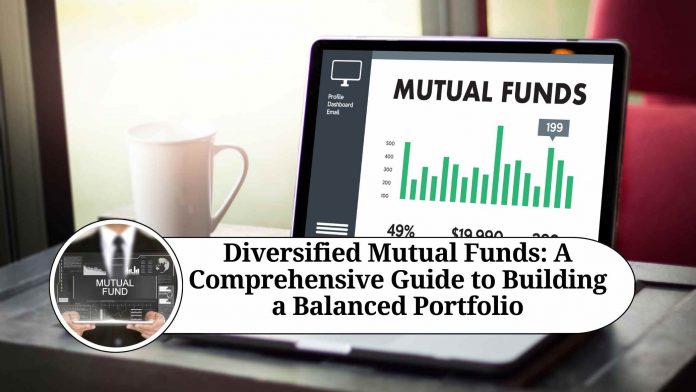Investing in mutual funds has become a popular option for many people looking to grow their wealth over time. Among the different types of mutual funds available, diversified mutual funds have gained a lot of attention due to their potential to offer a balanced investment portfolio.
In this blog, we will explore diversified mutual funds and their features, benefits, and risks.
What are Diversified Mutual Funds?
Diversified mutual funds are investment portfolios that hold a mix of stocks, bonds, and other securities from different industries and sectors. These funds are designed to provide investors with a balanced portfolio that spreads risk across a variety of asset classes.
Diversified mutual funds are managed by professional portfolio managers who select securities based on various factors such as market trends, economic conditions, and company performance.
Features of Diversified Mutual Funds
Diversified mutual funds have several features that make them unique from other types of mutual funds. Here are some of the key features of diversified mutual funds:
- Asset Allocation: Diversified mutual funds invest in a mix of asset classes, such as stocks, bonds, and cash equivalents. The allocation of these assets is done based on the fund’s investment objective and risk tolerance.
- Professional Management: Diversified mutual funds are managed by professional portfolio managers who have expertise in selecting and managing securities.
- Risk Diversification: Diversified mutual funds invest in different sectors and industries, which helps to reduce the risk associated with investing in a single company or industry.
- Liquidity: Diversified mutual funds are generally considered to be liquid investments, meaning that investors can buy and sell their shares easily.
Benefits of Diversified Mutual Funds
Diversified mutual funds offer several benefits to investors. Here are some of the key benefits of diversified mutual funds:
- Risk Reduction: Diversified mutual funds reduce the risk associated with investing in a single company or industry. By investing in a variety of asset classes, investors can spread risk across different sectors and industries.
- Professional Management: Diversified mutual funds are managed by professional portfolio managers who have expertise in selecting and managing securities.
- Convenience: Diversified mutual funds are easy to buy and sell, making them a convenient investment option for investors.
- Potential for Higher Returns: Diversified mutual funds have the potential to offer higher returns than other types of mutual funds. By investing in a mix of asset classes, investors can benefit from the growth potential of different sectors and industries.
Risks of Diversified Mutual Funds
Diversified mutual funds also come with certain risks that investors should be aware of. Here are some of the key risks associated with diversified mutual funds:
- Market Risk: Diversified mutual funds are subject to market risk, which means that the value of the fund can fluctuate based on market conditions.
- Management Risk: The performance of diversified mutual funds is highly dependent on the skill and expertise of the portfolio manager.
- Fees and Expenses: Diversified mutual funds come with fees and expenses, which can reduce the overall returns of the investment.
- Lack of Control: Investors in diversified mutual funds have limited control over the selection of securities in the portfolio.
How to Choose a Diversified Mutual Fund
When choosing a diversified mutual fund, it is important to consider several factors. Here are some key factors to keep in mind:
- Investment Objective: Review the investment objective of the fund to ensure it aligns with your financial goals and risk tolerance.
- Asset Allocation: Understand the fund’s allocation across different asset classes, such as stocks, bonds, and cash equivalents, and how it aligns with your investment objectives.
- Historical Performance: Review the fund’s historical performance over different time periods to gain insight into its consistency and potential for growth.
- Fees and Expenses: Understand the fund’s fees and expenses, including management fees, administrative fees, and any other charges that may impact your returns.
- Portfolio Manager: Understand the portfolio manager’s experience, investment style, and track record in managing diversified mutual funds.
Types of Diversified Mutual Funds
There are several types of diversified mutual funds to choose from, each with a unique investment objective and strategy. Here are some common types of diversified mutual funds:
- Balanced Funds: These funds invest in a mix of stocks and bonds, with the goal of providing investors with a balanced portfolio.
- Target Date Funds: These funds are designed for investors who have a specific retirement date in mind. The portfolio is managed to become more conservative as the target date approaches.
- Asset Allocation Funds: These funds invest in a mix of asset classes, with the allocation determined by the fund manager based on market conditions.
- Index Funds: These funds track a specific market index, such as the S&P 500 or NASDAQ, and offer investors exposure to a broad range of companies.
- Global Funds: These funds invest in securities from companies around the world, providing exposure to different regions and markets.
Diversified Mutual Funds vs. Index Funds
Diversified mutual funds and index funds are both popular investment options, but they differ in their investment strategies. Diversified mutual funds are actively managed by a portfolio manager, who selects securities based on various factors such as market trends, economic conditions, and company performance. Index funds, on the other hand, track a specific market index and require little management.
While index funds generally have lower fees and expenses compared to diversified mutual funds, they may not offer the same potential for growth and risk reduction as a diversified mutual fund managed by a professional portfolio manager.
Conclusion
Diversified mutual funds can be an attractive investment option for investors seeking a balanced portfolio with reduced risk. These funds offer several benefits, including risk reduction, professional management, and convenience. However, they also come with certain risks, such as market risk, management risk, and fees and expenses.
When choosing a diversified mutual fund, it is important to consider several factors, such as investment objective, asset allocation, historical performance, fees and expenses, and portfolio manager experience. By carefully evaluating these factors, investors can make informed decisions about their investments and potentially achieve their financial goals over time.
Read more useful content:
Frequently Asked Questions (FAQs)
What is a diversified mutual fund?
A diversified mutual fund is a type of mutual fund that invests in a variety of securities, such as stocks, bonds, and cash equivalents, to reduce risk and provide investors with a balanced portfolio.
What are the benefits of investing in diversified mutual funds?
Diversified mutual funds offer several benefits, including reduced risk, professional management, and convenience. These funds allow investors to gain exposure to a variety of securities without having to manage their investments themselves.
How do diversified mutual funds reduce risk?
Diversified mutual funds reduce risk by investing in a variety of securities across different asset classes, which helps to spread risk and reduce the impact of any one security or market sector on the portfolio.
What factors should I consider when choosing a diversified mutual fund?
When choosing a diversified mutual fund, it’s important to consider factors such as investment objective, asset allocation, historical performance, fees and expenses, and portfolio manager experience.
How much should I invest in a diversified mutual fund?
The amount you should invest in a diversified mutual fund depends on your financial goals, risk tolerance, and investment timeframe. It’s important to work with a financial advisor to determine the appropriate investment amount for your individual circumstances.
Are diversified mutual funds a good investment for beginners?
Diversified mutual funds can be a good investment for beginners, as they offer professional management and reduced risk. However, it’s important to understand the fees and expenses associated with these funds and to choose a fund that aligns with your investment objectives.
Can I lose money investing in diversified mutual funds?
Yes, it is possible to lose money investing in diversified mutual funds, as with any investment. However, these funds are designed to reduce risk and provide a balanced portfolio, which can help to mitigate losses during market downturns.
How often should I review my diversified mutual fund investments?
It’s a good idea to review your diversified mutual fund investments periodically, such as once a year or after major market events, to ensure that the fund is still aligned with your investment objectives and risk tolerance.
Can I switch between different diversified mutual funds?
Yes, you can switch between different diversified mutual funds, although there may be fees and expenses associated with doing so. It’s important to review the new fund’s investment objectives and fees before making a switch.
What are the tax implications of investing in diversified mutual funds?
Diversified mutual funds can have tax implications, such as capital gains taxes on the sale of securities within the fund. It’s important to work with a tax advisor to understand the potential tax implications of your investments.




















